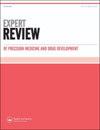Slotting metabolomics into routine precision medicine
IF 1.2
Q4 PHARMACOLOGY & PHARMACY
Expert Review of Precision Medicine and Drug Development
Pub Date : 2021-04-13
DOI:10.1080/23808993.2021.1911639
引用次数: 10
Abstract
ABSTRACT Introduction Despite an impressive amount of metabolomics studies in animal models and humans, most findings have not yet translated into the clinical setting, and the road ahead remains still long. Areas covered This review provides the most challenging applications of clinical metabolomics testing in human health and disease. Personalized clinical metabolomics testing is incorporated within the test panel to diagnose inborn errors of metabolism, optimize dietary regimens, and discover and develop new drugs. The potential routine utilization of metabolomics in precision medicine has been revised in cancer and nutrition. The association between metabolomics with artificial intelligence and machine learning may open emerging perspectives for more effective utilization and timely introduction of clinical metabolomics testing in the care of patients with acute and chronic diseases. Expert opinion In conclusion, slotting metabolomics into routine precision medicine implies the direct relationship between metabolomic results and clinical decision-making, similarly to any other clinical test result, as well as it requires the application of clinical laboratory standards, protocols, training, the oversight to a global biochemical profiling technology, and the availability of metabolic profiles from reference populations, defining cutoff values and decision levels.将代谢组学引入常规精准医学
尽管在动物模型和人类中进行了大量的代谢组学研究,但大多数研究结果尚未转化为临床环境,前面的道路仍然很长。本综述提供了临床代谢组学检测在人类健康和疾病方面最具挑战性的应用。将个性化临床代谢组学检测纳入检测面板,诊断先天性代谢错误,优化饮食方案,发现和开发新药。代谢组学在精准医学中的潜在常规应用已经在癌症和营养方面得到了修订。代谢组学与人工智能和机器学习之间的关联可能会为在急慢性疾病患者的护理中更有效地利用和及时引入临床代谢组学测试开辟新的视角。总之,将代谢组学纳入常规精准医学意味着代谢组学结果与临床决策之间的直接关系,类似于任何其他临床检测结果,并且它需要应用临床实验室标准,协议,培训,对全球生化分析技术的监督,以及参考人群代谢谱的可用性,定义临界值和决策水平。
本文章由计算机程序翻译,如有差异,请以英文原文为准。
求助全文
约1分钟内获得全文
求助全文
来源期刊

Expert Review of Precision Medicine and Drug Development
PHARMACOLOGY & PHARMACY-
CiteScore
2.30
自引率
0.00%
发文量
9
期刊介绍:
Expert Review of Precision Medicine and Drug Development publishes primarily review articles covering the development and clinical application of medicine to be used in a personalized therapy setting; in addition, the journal also publishes original research and commentary-style articles. In an era where medicine is recognizing that a one-size-fits-all approach is not always appropriate, it has become necessary to identify patients responsive to treatments and treat patient populations using a tailored approach. Areas covered include: Development and application of drugs targeted to specific genotypes and populations, as well as advanced diagnostic technologies and significant biomarkers that aid in this. Clinical trials and case studies within personalized therapy and drug development. Screening, prediction and prevention of disease, prediction of adverse events, treatment monitoring, effects of metabolomics and microbiomics on treatment. Secondary population research, genome-wide association studies, disease–gene association studies, personal genome technologies. Ethical and cost–benefit issues, the impact to healthcare and business infrastructure, and regulatory issues.
 求助内容:
求助内容: 应助结果提醒方式:
应助结果提醒方式:


